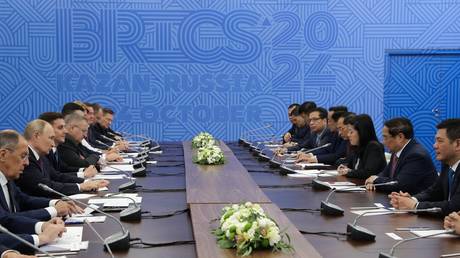Fyodor Lukyanov Explains What the West Gets Wrong About BRICS
Tensions with the US and its allies might be unavoidable; however, such conflict is not the intention of the group's members.

The recent BRICS Summit in Kazan marked a notable global event in terms of its representativeness and the range of issues addressed. With the organizers receiving well-deserved acclaim, it’s important to examine how this forum differed from its predecessors and its broader significance.
For starters, this summit represented the first time the event was held in an expanded format. Previously, meetings with four or five participants tended to be informal and somewhat intimate, regardless of the consistent high level of interest. The current composition already includes a diverse group of states, making management a complex task that likely necessitates coordinated institutions. The current chair has primarily taken on this organizing role, and it seems that a more flexible, rotating model may suit the complexities of such an organization better than formalized administrative structures.
However, the limitations of this unbureaucratic approach have become evident. It demands significant effort from the chairing country, and the effectiveness of such leadership hinges on the willingness of each prominent member to contribute. Commitment levels towards the development of BRICS differ among participants; while Russia expresses considerable enthusiasm, not all members share the same level of importance regarding the initiative, despite their overall support.
The debate over whether to prioritize expansion or deepen interactions through institutionalization appears to be settled: the two are interconnected.
Next, BRICS operates on two fronts: current and long-term. While these dimensions are not conflicting, they vary in focus.
In the short term, lofty goals have been articulated. A foundational consensus has emerged, and in certain areas, such as the situation in Ukraine, there has been a concerted refining of those positions. This alone is a significant accomplishment, considering the diversity of the group’s composition. The final declarations do not call for a complete overhaul of the global order but emphasize the need for improvements to existing institutions, such as the UN Security Council, IMF, and WTO. Therefore, no revolutionary changes or ideological shifts are proposed, countering the revisionist narratives often attributed to Russia and other BRICS members by the West.
The long-term perspective is more significant. BRICS embodies the global shift toward a redistribution of power and the reorganization of the international system, establishing an alternative space alongside the previously dominant Western institutions and interests. Essentially, BRICS serves an anti-monopoly function by fostering competition and curbing monopolistic tendencies on a global scale.
This evolution is a natural outcome, initiated not by BRICS itself but as a reflection of international changes. The framework provided by BRICS has emerged as an effective platform to facilitate these developments.
The declaration included practical decisions that intertwine both dimensions, addressing competition, investment, technology, energy, and grain policy. While immediate actions are laid out, they also aim to reshape the international structure in the longer term. Although numerous obstacles lie ahead, the path toward transformation has unmistakably begun.
A key aspect of this transformation lies in the financial and monetary dominance of the United States, a crucial tool of its global influence. This hegemony stems not only from the power wielded by the issuer of the world’s reserve currency but also from the practical advantages it offers to the international community.
Shifting the primary currency used in global trade would entail extensive changes to the existing system, affecting all nations engaged in international commerce. For countries like Russia and Iran, the transition has been compelled by their experiences with monetary hegemony. Others, however, hesitate to act hastily, even if they acknowledge the risks of future punitive measures.
The collective acknowledgment among all BRICS members and partners regarding the challenges posed by dollar dominance is a significant development. They are essentially prepared to collaborate on establishing a parallel financial system, albeit this task is laden with complexities. This endeavor does not involve simply replacing the dollar with another universal currency but rather creating diverse trade and financial relationships, ranging from bilateral to various multilateral arrangements. Clear solutions remain elusive, but progress is evident. The diminishing derision in Western commentary toward BRICS reflects a serious reassessment of its potential.
In conclusion, all BRICS members and partners maintain that they are not attempting to construct an “anti-world” structure, one intended solely to counteract Western influence. The perception of BRICS as anti-Western is often rooted in the political psyche of the US and its allies, which have historically dismissed any political or economic coalitions that lie outside their direct control. This mindset simultaneously challenges the acknowledgment of a multipolar international system.
Indeed, only Russia and, to a lesser degree, Iran are currently at odds with the West, while other members prefer to avoid conflict that could limit their developmental opportunities. Initiatives within BRICS are designed not to provoke confrontation but to facilitate diversification and create pathways to operate independently of Western involvement. While conflict may be unavoidable, it is not the primary goal for this emerging community.
The BRIC/BRICS acronym has evolved over more than two decades from a marketing strategy developed by a prominent Wall Street institution into a prestigious forum representing the non-Western world. This transformation symbolizes a broader historical trajectory, with the Kazan Summit serving as a significant milestone along that path.
This article was originally published in Rossiyskaya Gazeta and has been translated and edited by the RTN team.
Ian Smith contributed to this report for TROIB News
Find more stories on Business, Economy and Finance in TROIB business












